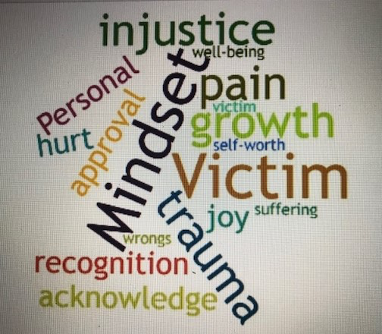Do you know anyone who:
- Really wants people who have hurt them to acknowledge the grave injustice done to them?
- Believes that they treat other people much better than they are treated?
- When they feel hurt by others, especially family and friends, must make sure that they are understood to be the party in the right?
- Continually dwell on the injustice dealt by others upon them?
Maybe this describes people you know. Maybe you recognize yourself.

What is the Victim Mindset?
It may start either by actual or perceived trauma.
One response to trauma is to embrace victimhood.
The victim seeks recognition of the wrong that has been suffered. That’s a natural response. However, the problem is when there becomes a continual and insatiable need for recognition of wrongs. The Victim Mindset then emerges.
When one embraces the Victim Mindset, one can begin to view oneself as morally superior to others.
Mindset: I always treat others better than I am treated.
This Victim Mindset tends to decrease empathy as Victims are so preoccupied with their own hurts that there is little room to acknowledge the pain of others.
Mindset: You think you have problems, they’re nothing compared to mine!”
The Victim Mindset will involve significant dwelling of past injustices. A Victim will not let go of the pain and suffering. It’s as painful today as it was in the past.
Why is the Victim Mindset harmful?
It creates a lack of willingness to forgive.
It creates the anticipation of more injustice. As an example, if one boss is mean, then even minor offenses of future bosses will be “proof” that all bosses are horrible and mean.
It creates the tendency to remember the negative and forget the positive.
It fosters low self-worth with a belief that victims have less worth. Thus, there is a higher need to seek approval from others. But while seeking approval, there is the expectation of rejection. This becomes an emotional no-win situation.
How to escape the Victim Mindset trap?
Adopt a new mindset. Recognize that trauma and injustice is an event. One can choose to learn from the experience and move on. Think of these events as an opportunity for personal growth.
The Personal Growth Mindset does not minimize the trauma and pain experienced, but it does allow you to put life events into a better perspective so that you may free yourself from the emotional chains of the past.
We get to choose. I invite you to choose to reject victimhood and embrace personal growth.
Personal growth leads to a sense of well-being and joy.
Why not choose joy. Everyday. Every time.
(source: “Unraveling the Mindset of Victimhood” by Scott Barry Kaufmann, 06-29-20, www.scientificamerica.com)


